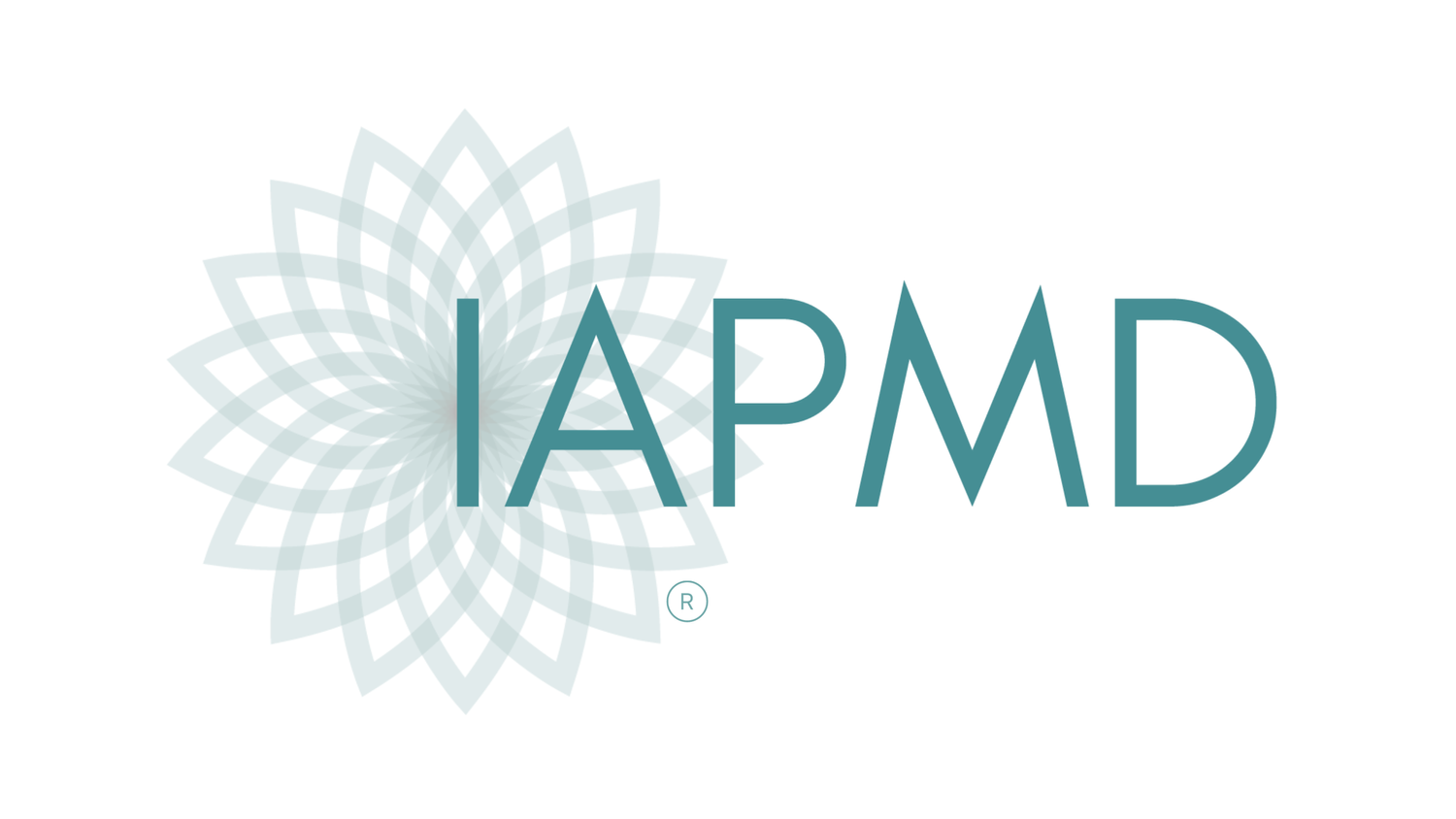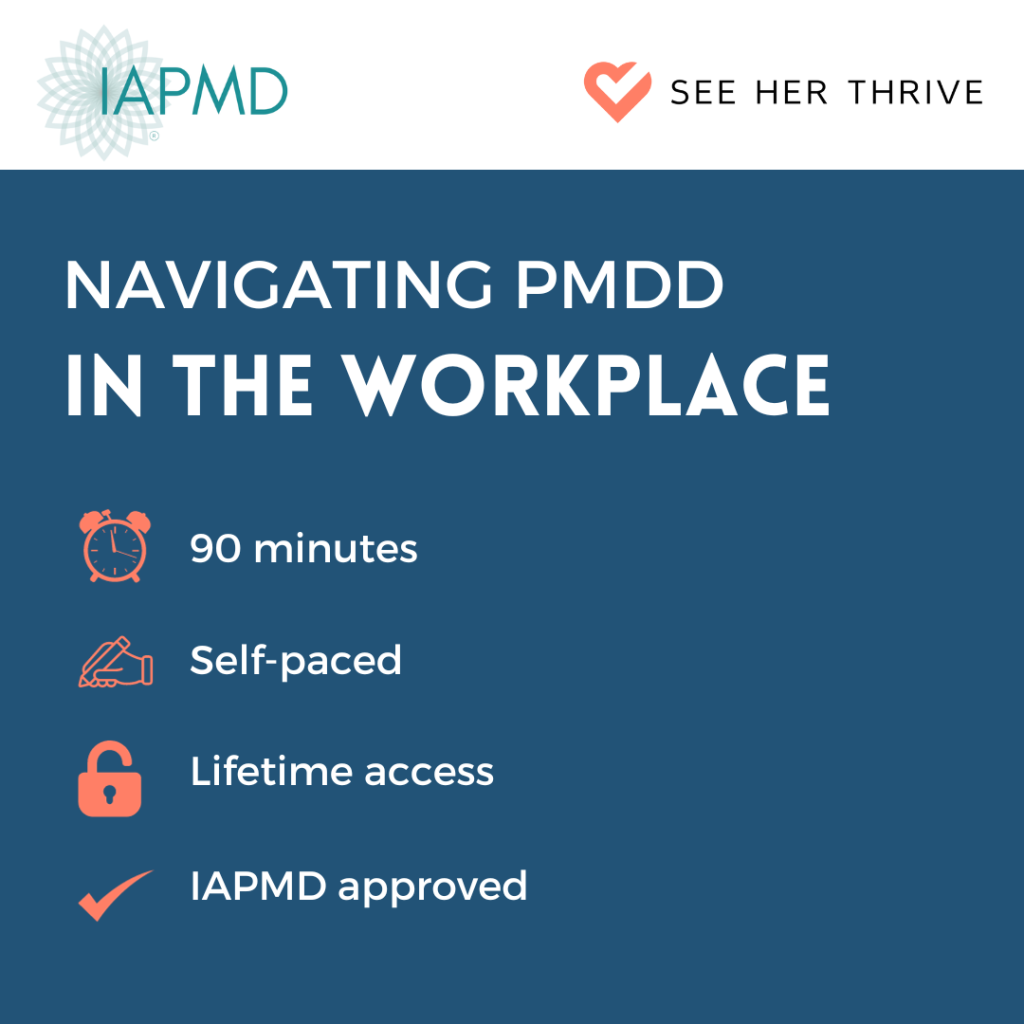PMDD & The Workplace
Coping with PMDD (Premenstrual Dysphoric Disorder) in any aspect of your life is a challenge. Dealing with PMDD at work can be especially difficult. Maintaining a business demeanor when you are experiencing violent mood swings, fatigue, anxiety, and often physical pain related to PMDD can seem an impossible thing to do. You may find that you need to be absent from work while your PMDD symptoms are at their most severe. You may wonder if you can do that without losing your job. There are some measures you can take to ensure that you can take the time off work that you need in order to cope with your PMDD symptoms without losing your job.
Looking for tools to help you navigate PMDD in the workplace? Join See Her Thrive, UK-based workplace consultants, for this 90 minute workshop to aid yourselves with knowledge and tools - specifically aimed at those with PMDD.
Navigating PMDD in the Workplace – On-Demand Workshop
PMDD brings unique challenges for each of us, and it can be hard to know where to start when it intersects with your professional life! This is where our empowering 90+ minute, self-paced workshop comes in.
Created by PMDD Warriors, for PMDD Warriors, and endorsed by IAPMD, this on-demand workshop can be taken at your own pace. It will provide you with the knowledge, insights, and practical solutions to conquer these challenges head-on.
£1 GBP of each purchase will be donated to IAPMD.
What you should know
You may be entitled to job-protected leave under the Family Medical Leave Act (FMLA) when leave is needed due to the symptoms of PMDD.
You may also be entitled to receive reasonable accommodations at work under the Americans with Disabilities Act (ADA). There is no comprehensive list of accommodations that employers are required to consider/provide and so each situation must be addressed case-by- case. A reasonable accommodation is any change or adjustment to a job or work environment that enables you to perform job duties when limited by your medical impairment.
To receive an accommodation under the ADA, you will need to explain that you have a medical condition impairment that limits your ability to perform job duties/meet standards, or may require you to sometimes take time off from work.
If you request an accommodation, or time off from work, you may need to have your healthcare provider substantiate that you have a medical impairment or serious health condition that requires accommodation and/or leave.
When to Disclose
Deciding when/if to disclose information about your medical impairment to your employer, or a prospective employer, is up to you. You will need to disclose in order to access resources, receive reasonable accommodations, or invoke protections that may be available to you. Choosing to disclose should include preparation. Steps to take before disclosing include assessing how you feel about sharing information about PMDD and obtaining the necessary documentation needed to substantiate the existence of your medical impairment.
If choosing to disclose when applying for a position, perhaps during the post-offer stage of the hiring process, have a well documented plan for working around your PMDD days and share this plan during the accommodation negotiation process. When deciding to disclose during the interviewing process, it may be beneficial to seek out companies with a solid background of supporting those with mental and physical disabilities. It is also important to remember that disclosure should occur before performance suffers, not be reserved until right before termination is imminent. (i.e. you're about to be fired).
Plan ahead for success and use the information below as a guide.
Steps You Can Take
To invoke your rights under the ADA or FMLA, you will need to inform your Human Resources department or your direct supervisor know you have a medical condition that may require you to be out of work occasionally. You do not need to go into great detail about your PMDD symptoms right away, but the employer needs to know that there is a work-related barrier due to a medical impairment and that you may require time off from work, or other accommodations, to enable you to be successful. You need to do this (no matter how embarrassing it may seem) in order to seek protection for using leave for reasons related to your PMDD symptoms.
FMLA - Family Medical Leave Act
If you work for an employer of 50 or more employees, have been employed there for at least 12 months, and have worked 1250 hours in the year before the need for leave, you may be able to use the FMLA to protect your job. Let your supervisor or someone in HR know that you would like to apply for FMLA leave if you have exhausted the leave time that is available to you through your employer’s leave program.
It’s important to let the employer know that you have a medical condition that may affect your ability to do your job at times. This is the first step to being able to use FMLA in order to take time off when your PMDD symptoms are at their most severe. You may need to have your doctor sign off and certify that you experience limitations from a medical condition and that you will need intermittent leave in order to cope with your PMDD symptoms. FMLA leave is job-protected leave and allows qualified employees the opportunity to take a limited amount of unpaid time off, without penalty, in order to cope with PMDD symptoms.
ADA - Americans with Disabilities Act
When FMLA does not apply, sometimes employees can receive leave as an accommodation under the ADA, which applies to private employers of 15 or more employees. Covered employers are required under the ADA to make reasonable accommodations to enable qualified individuals with disabilities to perform job duties. Accommodations may include allowing time off from work when your PMDD symptoms are at their worst, or allowing you a private workspace when your PMDD symptoms make it difficult to interact directly with other people. As long as your request does not cause undue hardship to your employer, it should be met so you are able to do your work.
Free Resources
An Employers Guide to PMDD - for UK-based Employers, Managers, HR and Organizational Development Professionals, and Occupational Health Consultants.
Job Accommodation Network (JAN)
The Job Accommodation Network (JAN) provides free, confidential technical assistance about job accommodations and the Americans with Disabilities Act (ADA). Contact a JAN Consultant at (800)526-7234 (Voice) / (877)781-9403 (TTY). Visit https://askjan.org/ for more information.
PMDD & Workplace Webinar
2.) Responding To Mental Illness in Your Workforce: Following the Law. Psych Central.com. Retrieved 10 March 2016, from http://psychcentral.com/lib/responding-to-mental-illness-in-your-workforce-following-the-law/
3.) ADA - Your Employment Rights as an Individual With a Disability. (2016). Eeoc.gov. Retrieved 10 March 2016, from http://www.eeoc.gov/facts/ada18.html
4.) Notice Concerning The Americans With Disabilities Act (ADA) Amendments Act of 2008. (2016).Eeoc.gov. Retrieved 10 March 2016, from http://www.eeoc.gov/laws/statutes/adaaa_notice.cfm
5.) New PMDD validity raises concerns. (2016). Employee Benefit News. Retrieved 10 March 2016, from http://www.benefitnews.com/news/new-pmdd-validity-raises-concerns
6.) "Disclosing Your Disability To An Employer | Center For Psychiatric Rehabilitation". 2017. Cpr.Bu.Edu. Accessed April 11 2017. https://cpr.bu.edu/resources/reasonable-accommodations/disclosing-your-disability.


